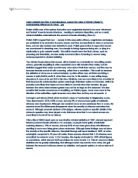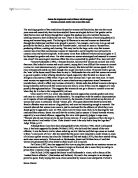Assess the functionalist view that religion benefits both society as a whole and its individual members.
5. 'Assess the functionalist view that religion benefits both society as a whole and its individual member. (18)' Functions have put forward their perspective on religion and how it benefits both society and the individual starting with how religion brings people together and creates social cohesion, which makes you feel like you belong in society as well as being apart of something which is much greater than yourself. While conforming to religious beliefs this allows us to gain morals, as well as giving us a variety of cultures allowing us to tolerate and accept different religions. Functionalists see religion as a positive aspect to society. Durkheim explains that religion makes a great contribution to society giving us social integration, and the source of social solidarity. His view on sacred symbols represents society's collective consciousness which is the shared norms, values beliefs and knowledge that make social life possible without such consciousness it would crumble. While participating in shares rituals binds individuals together reminding them that they are a part of a community which they owe loyalty. The power of society came from these rituals and without them they are nothing, to which they owe everything. The individual see's religion performing a significant function allowing them to feel apart of society and seeing that religion strengthens us to face
Evaluate the Functionalist explanations of Deviance.
Sociology Essay Evaluate the Functionalist explanations of Deviance (50 marks) Functionalism has been one of the most important approaches in explaining deviant behaviour. Functionalism has also played an important part in explaining other areas of sociology, such as health and education. In basic Functionalist terms, if something exists in society it must have a purpose for existing, and, since crime exists, it must perform functions for the society. Functionalist explanations look at the implications of crime and crime control policies, rather than directly attempting to explain the causes of criminal behaviour. However, unlike other models that eliminate blame from offenders by claiming criminals have little free will, a functionalist approach favours suppression of criminal activity and the use of appropriate sanctions. The major difference between functionalist and all other theories of crime causation is its apparent positive view of deviant behaviour. Durkheim identified two different sides of crime, a positive side, which helped society change and remain dynamic, and a negative side, which saw too much crime leading to social disruption. He claimed that a limited amount of crime was necessary for any society. Durkheim argued that as societies develop and grow, the collective conscience, or shared values, which guide our actions and provide boundaries, are
Using material from item A and elsewhere, assess the contribution of religion to social change (18 marks)
Using material from item A and elsewhere, assess the contribution of religion to social change (18 marks) Some sociologists have argued that religion can bring about social change; others have argued however that religion does in fact cause social change. Yet some believe that religion can be both a conservative force and a force for social change. Max Weber believed in the social action theory, where religious beliefs of Calvinists helped to bring about social change. This is supported in item A 'religious ideas can be a powerful motivation for change, as Weber showed in his study of Calvinism.' The emergence of modern capitalism in Northern Europe in the 16th and 17th centuries was due to Calvinist beliefs. Calvinists had several distinctive beliefs. Predestination, where god had predetermined whether a soul will be saved or not and there is nothing you can do to change this. Devine transcendence, no individual can claim to know god's ill, which made people feel inner loneliness and 'salvation panic'. Asceticism, abstinence, self-discipline and self-denial were required by Calvinist's and prepared them for a life under capitalism. Vocation or calling, Calvinist's introduced the idea of this worldly asceticism, which meant constant methodical work in occupation and was a religious duty. Again preparing people of life under capitalism as it requires hard work. Weber did
Assess the usefulness of feminist contributions to our understanding of society today
Assess the usefulness of feminist contributions to our understanding of society today (33 marks) Feminism is a conflict theory that sees religion as an instrument of patriarchy - a set of beliefs and practices responsible for women's subordination. There are different types of feminism and the types I will be evaluating in this essay are Liberal, Radical, Marxist and Difference/poststructuralist feminist. Feminists criticise mainstream sociology for being 'malestream'. By contrast, feminists examine society from the viewpoint of women, they see their work as part of the struggle against women's subordination. However, although all feminists oppose women's subordination, there are disagreements among feminist's theories about its causes and how to overcome them. Liberal feminist are concerned with the human and civil rights and freedoms of the individual, they believe that all human beings should have equal rights. In liberal feminism, the concept of society changing itself to adapt to women does not occur. Liberal feminists insist that all that is needed to change the status of women is to change existing laws that are unfavourable for women and that will open up more opportunities for women to prove themselves as equal to the opposite sex. Oakley (1972) distinguishes between sex and gender. She claims sex differences are seen as fixed and gender differences vary between
Education is the main agent of secondary socialisation. How do schools prepare us for social life?
Education is the main agent of secondary socialisation. How do schools prepare us for social life? Whatever the view on education, it is clear that schools are one of the most important agents of secondary socialisation. Peer groups and teachers have a major impact upon the socialisation of schoolchildren. In the case of the former, such groups exert "peer pressure" which influence students to conform to various norms and values. Sociologists often see the relationship between society and education results as similar, but explain them in different ways. Socialisation is the process whereby we learn to become competent members of a group. Primary socialisation is the learning we experience from the people who raise us. On the other hand, secondary socialisation takes place mostly outside the place where we are raised. Functionalists see a relationship between education and other social institutions, and the contribution education makes to meet the functional needs of the social system as a whole; education is viewed as meritocratic whereby it is fair on everyone and the main key agents for success are intelligence and effort. Durkheim argues that education prepares young children to be able to conform to social life. By teaching the children values, norms and to obey authority and understand their role in society, education fulfils the needs of society. School can be viewed
Outline and assess Functionalist explanations of the role of the education system.
Outline and assess Functionalist explanations of the role of the education system. (50) ________________ As a theory which places heavy emphasis on the analysis of institutions and their relationship with society, especially with regards to the functions of institutions, Functionalists place a significant amount of focus on the education system. However, this perspective is not always accepted, it’s macro theory approach is often seen as too wide bearing to be applied to the study of the education system as well as critics which dispute the functions of the education system as portrayed by functionalists. Nevertheless, its macro theory approach puts the education system in context and is therefore a theory which is notable when discussing the role of the education system. Firstly, it cannot be ignored that one of the main principles of the theory is that society is based upon consensus, - agreement between norms and values. As an institution of secondary socialisation, Functionalist theorists see the education system as one of the main institutions which help to achieve value consensus within society, allowing society to operate in a smooth manner. Durkheim suggested that the education system is an institution which helps to create a “collective consciousness”, uniting society into one body, with the system creating “social beings”. As put forward by Durkheim,
Assess the role of the media
Assessing The Role Of The Media In society the media is, arguably, one of - if not the - most powerful of institutions however some sociologists would argue, for example Baudrillard, that its' power is diminishing or weak. The media is debated widely both assessing its' influence and functions, or in some cases dysfunctions. The media's primary function is to inform the masses which is the origin of its' overwhelming power in society because obviously through manipulating what the masses are informed of - censorship - and the altering the portrayal of parts of the news the media - propaganda - they are able to control our thoughts - ideological control. The media is associated with not only informing the public but furthermore representing the public and bringing up moral, political and social issues on behalf of the public. Also the media gives the public freedom to express and broadcast their views and opinions; take Youtube for example, Youtube allows anyone to broadcast online videos, newsfeeds and blogs it enforces freedom of speech and Youtube along with other independent media sources, such as The Independent, ITV etc. increase and extend democracy in the UK. Dahl, a pluralist would agree with this view of the media, that the media informs us, and he says that the media demonstrates thousands of millions of different views and opinions, it broadcasts many different
Examine the View that the Family is a Universal Institution
Examine the View that the Family is a Universal Institution Many sociologists regard the family as the foundation of society. It forms the basic unit of social organisation and it hard to imagine how society could function without the family. The family is considered a good thing for individuals and society. There are many variations of the family, yet in general the most common type is the nuclear family. This consists of two adults of different genders with two dependant children. George Murdock took a sample of 250 societies and concluded that in some form the family existed in every society. Therefore the family is a universal institution; as there is a type of family in every society worldwide. Murdock concluded, "the nuclear family is a universal human social grouping, either as the sole prevailing form which more complex forms are compounded, it exists as a distinct an strongly functional group in every known society". The family is universal because it performs essential function necessary for survival and continuity. This then proves that the family works efficiently together and uses its resources effectively in society. The family's purpose for society is inseparable from its purpose for its individual members. The sexual function is a good example that the family serves both at the same time in the same way. The husband and wife have the right of sexual contact
Examine the factors affecting the domestic division of labour and power relations between couples.
Examine the factors affecting the domestic division of labour and power relations between couples. Domestic division of labour is the division of tasks, roles and duties, within the household. With the increased entry of married women into formal employment, sociologists began to look more closely at the processes that linked home and workplace, including the question of whether or not women's increased involvement in paid labour led to a renegotiation of the traditional domestic roles and organization of domestic labour. A major characteristic of the symmetrical family outlined by Young and Willmott was the degree to which spouses shared domestic work and leisure activities. In Young and Willmott's stage 2 family, conjugal roles were largely segregated. There was a clear cut division of labour between spouses in the household and the husband was relatively uninvolved with domestic chores and raising the children. The wife is associated mainly with her female kin and neighbours and the husband with his male workmates, kin and neighbours. In the stage 3 symmetrical families, conjugal roles become joint, however the wife still has primary responsibility for housework and child rearing, husbands become more involved, often washing clothes, ironing and sharing other domestic duties. Husband and wife shared responsibility for decisions that affect the family; they discuss matters
Using material from item A and elsewhere, assess the contribution of functionalism to our understanding of families and households
Examining the Functions of the Family . Explain what is meant by consensus? Consensus is an agreement among a majority of members of society that something is good and worthwhile, it’s a set of shared norms and values, into which society socialises it’s members . Identify the two essential functions that Parsons sees the nuclear family as performing? Using material from item A and elsewhere, assess the contribution of functionalism to our understanding of families and households? Functionalists believe that society is based on a value consensus; this is a set of shared norms and values into which society socialises its members. This enables society to work harmoniously and meet its needs and goals. Functionalists view society as being made up of a number of sub-systems that are dependent upon each other. These can include the education system, media, religion, and the economy. Just as the human body is dependent upon each of the functions in order to survive, society is dependent on each of the sub-systems. The family meets some of society’s essential needs by socialising children. This is regarded as a basic building block of society. Murdock argues that the family performs four essential functions to meet the needs of society and its members. These include; stable satisfaction of the sex drive, reproduction of the next generation, socialisation of the young















![Outline and evaluate the functionalist view of the role of the family in society [33 marks]](https://mbt-essays-prod-public.s3.eu-west-1.amazonaws.com/1211066/listing/1211066_1.jpg)











